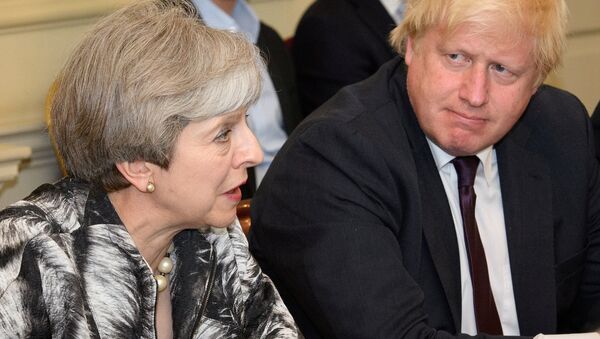Former British Foreign Secretary Boris Johnson took another swipe at Theresa May's beleaguered Brexit plan, urging the PM to scrap it and "change the course" of divorce talks with Brussels.
In an op-ed piece for The Telegraph, Johnson, a devout Brexiteer who quit over Theresa May's Chequers plan in July, maintained that "the single greatest failing has been the government's appalling and inexplicable delay in setting out a vision for what Brexit is."
While admitting that his alternative Brexit vision might necessitate an extension of the transition period beyond 2020, he lambasted Theresa May for her "pretty invertebrate performance" as Prime Minister. He also scolded May's negotiating tactics over what he called "basic nervousness" and "lack of conviction," claiming that it has put the UK in a weak position in Brexit talks.
Johnson laid out his position on the two sticking points in the ongoing negotiations: the Irish border and post-Brexit customs arrangements. He stressed that there was no need for a hard border and argued that any checks could be carried out away from the border crossing. He also insisted that Britain should negotiate what he called a "Super Canada" deal, which he said would stipulate "zero tariffs and zero quotas" on all imports and exports, as well as mutual recognition agreements between the UK and the EU to ensure "conformity of goods with each other's standards," and also a deal covering both goods and services.
READ MORE: 'No Deal Brexit Clearly Won't be a Disaster as Corbyn Suggests' — Politician
Although Johnson's piece didn't call for toppling May, it will likely spark speculation that Johnson is emerging as a new Tory leader. Earlier this month, reports surfaced that he would address a gathering of Tory grassroots activists in early October, a day before Theresa May's keynote speech at the annual party conference in Birmingham.
Theresa May published her Chequers proposal in July to present her vision of post-Brexit relations with the EU. Under it, London would leave the EU's customs union and single market but would set up a free trade area for all goods. At the same time, May wanted London have freedom of action in the market for services.
Moreover, the PM by all means wants to avoid a hard border between Northern Ireland and the Republic of Ireland, and between Northern Ireland and the rest of the UK. She has turned down the EU's "backstop" plan to keep Northern Ireland in the EU single market and set up a hard border in Ireland.
However, her Brexit plan, which she said was the only viable offer on the table, was slammed by fellow EU leaders at last week's summit in Salzburg, who refused to compromise on issues such as the single market and the Irish "backstop" question.
Theresa May responded to the criticism that she wouldn't seek to delay Brexit even if London and Brussels fail to strike a deal. This comes six months before Britain's looming departure from the bloc, scheduled for March 29 of next year. Although the UK and the EU have agreed on a transition period for leaving the single market and customs union until the end of 2020, a lack of clarity will likely prompt both sides to prepare for a no-deal scenario, which would see the two longtime partners trade on bare WTO terms that economists warn would harm both economies.



